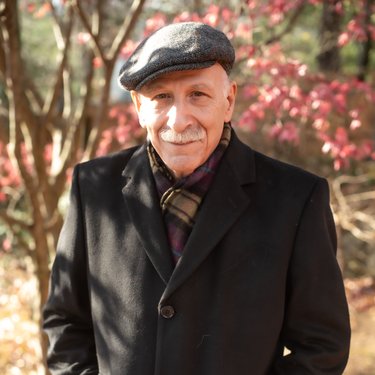Novel explores shadows cast across decades by JFK’s victory — and death
GUILDERLAND — The characters in Peter Golden’s latest novel, set in the year that runs from December 1959 to 1960, are young and vibrant.
Fictionalized characters mingle with historic ones, most notably John F. Kennedy, making his run for president.
Yet the book opens with lines from William Butler Yeats’s poem, “When You Are Old,” with the poet urging the reader, nodding by the fire, to “take down this book/ And slowly read, and dream of the soft look/ Your eyes had once, and of their shadows deep ….”
The novel’s title — “Their Shadows Deep” — comes from those lines.
“That’s my title …,” said Golden. “I’m the one looking back.”
He wrote the book for his son and daughter-in-law, who are in their thirties.
“I wanted to explain to them how the country felt about this man,” Golden said of Kennedy. “The whole tenor of the country changed on November 22, 1963,” he said, referring to the date of Kennedy’s assassination. “These shadows were cast across decades,” he said.
Golden described the optimism he felt in his youth with Kennedy’s election: “The country’s going to move again … we’re going to dance on the moon and all these things people felt when he got elected — and quite the opposite of course is what happened.
“I wanted to try and explain that feeling of loss to my son and to my daughter-in-law and why their parents would look back in a different way than they do.”
In a way, Golden said, he has been working on this book since he was a child and watched the debate between Kennedy and Nixon on television.
“It’s like I was destined to write it; I just didn’t know it,” he said.
The book is largely set in New York City but the central female character, Caitlin, has New Jersey roots, where Golden himself grew up. Golden writes about New Jersey, he said, because he knows it; he understands the people there.
He grew up in an era where suburban New Jersey encompassed a wide variety of people. Some of his friends had fathers who were wealthy stockbrokers while other of his friends were raised by single parents in duplexes.
“We were a cross-section of people — Black, Jewish, Irish Catholic, Protestant … It’s a really interesting way to grow up,” said Golden.
He concluded, “It just seems like a place I know. My main characters come from there.”
Golden recently went back to a high school reunion where Irish Catholic classmates recalled their feelings when Kennedy was elected and their devastation when he was killed.
He brought to the book the anti-Catholic prejudice that was prevalent at the time.
“Responsible people would say things like, “The pope is going to run the United States.’ I mean, it was really, really crazy. Now that’s been lost to time,” said Golden.
Golden, who does not see himself as a politician, was elected to the Guilderland School Board for one term, from 2005 to 2008, and subsequently ran for town supervisor, then twice, in 2011 and 2019, ran to represent his Guilderland district in the county legislature.
Golden said he views involvement in local politics as more of a community service than a profession, “This is important because it has such a deep impact on the people who live closest to you,” he said when making his unsuccessful run for Guilderland supervisor in 2009.
Golden, who has written a history of the Cold War, “O Powerful Western Star,” immersed himself in reading books about Kennedy as well as researching news accounts of the era.
What he found was missing was a sense of Kennedy’s inner life.
“There’s very little available about his internal world,” said Golden, “his psychology, his emotional conflicts,” he said, contrasting it with, say, Harry S. Truman who wrote many letters to his wife “so you know how he felt about everything.”
Golden reviewed Kennedy’s medical records, which were made public early in this century. “He was in pain for much of his life, which in itself, is its own trial,” said Golden.
The book relates how Kennedy was hospitalized at age 3 for scarlet fever, deathly ill while in prep school, and nearly died when the PT boat he commanded sank during World War II; he received last rites four times.
“In the novel, I have his wife say, the greatest thing my husband does every day is get out of bed,” said Golden.
The book also focuses on Kennedy’s preoccupation with death — a brother and sister died young during the war and Kennedy was convinced that he, too, would die young.
“His attitude wasn’t courage but accepting that everyone was headed to the grave,” the novel says.
Golden tells the story of a friend’s uncle who had landed at Normandy as part of the Allied invasion. He was dying from cancer at a young age. Everyone around the dying man was sad and crying but the uncle seemed just fine.
His nephew asked his uncle why he was sanguine.
“Let me tell you something,” the uncle said. “Every day after June 6th, 1944 was great and that’s how I feel. I should have died on that beach but I didn’t.”
The novel’s plot centers around Caitlin’s efforts to retrieve a video of Kennedy having sex with a prostitute, a mission Kennedy asked of her husband, a CIA operative, who was murdered for his attempt.
Golden wrote the novel in an era where a plurality of Americans have elected a president who brags about sexually assaulting women. Asked to explain the difference between Kennedy’s era and now, Golden described a mid-century mindset exemplified by Lucille Ball’s “I Love Lucy” sitcom.
He notes that the characters as well as the actors, Ball and Desi Arnaz, were married and having a baby. “The rules were such that they had to show them in twin beds,” said Golden.
One of the characters in Golden’s novel who was a real-life columnist, Joseph Aslop, was gay. “The Russians had pictures of that … but no one ever used it against him,” said Golden.
In the novel, Kennedy’s father tells his son, if his womanizing were public, he could forget about the Catholic vote.
“Sex is out in the open now,” said Golden, contrasting the press’s handling of Kennedy with modern coverage.
He also said the rules of decorum in general have changed, noting that, in the Nixon-Kennedy debate, Nixon called Kennedy a patriot and a good man, and Kennedy followed suit.
Debate was about policy disagreements. “People don’t watch debates for that anymore,” said Golden. “Now they watch to see people tear each other up. It’s like mud wrestling.”
Golden concluded that the current debate style “says more about who we are as a people — we have become a much cruder society.”
A character in Golden’s book, a friend of Caitlin, says that King Solomon had many mistresses and was considered the wisest of leaders.
Caitlin herself adopts this attitude in deciding to vote for Kennedy despite his moral failings.
In his novel, Golden creates parallels between Caitlin and Jackie Kennedy: They both suffer miscarriages and they both watch their husbands get murdered, each declining to change out of their blood-stained clothes.
So Caitlin’s acceptance of Kennedy’s having sex with other women while extolling his wife’s strength has particular resonance.
In his quest to depict what he imagines is Kennedy’s “internal world,” Golden spoke with a friend of his, a therapist whose practice deals exclusively with sexual addiction.
“I tried to incorporate what I learned from him … he told me there is always shame involved … They’re ashamed they can’t control themselves because they promised themselves they’re going to stop,” said Golden of the sex addicts his friend treats.
He said of Kennedy, “He certainly was intelligent and perceptive enough to understand this was not just pure lust, that there was something else.”
Golden wrote the end of his novel well ahead of most of it.
“I knew how it would end. I knew what she was thinking,” he said of Caitlin. “And I worked back from that.”
The novel ends just after Kennedy’s election. Caitlin imagines her future. She would return to Jersey, marry, and live in a house she’d always admired.
“Life would be good there,” she muses. “Eight tranquil years would pass by in a bright turning of seasons, with Jack and Jackie and Caroline and the new baby in the White House, and the First Family would happily grow older with all the other families in America.
“It was coming. This better time. Caitlin was sure of it ….
****
“Their Shadows Deep” goes on sale on Feb. 1. The 352-page paperback costs $16.99 on Amazon. Peter Golden said it will also be sold at local book stores.



